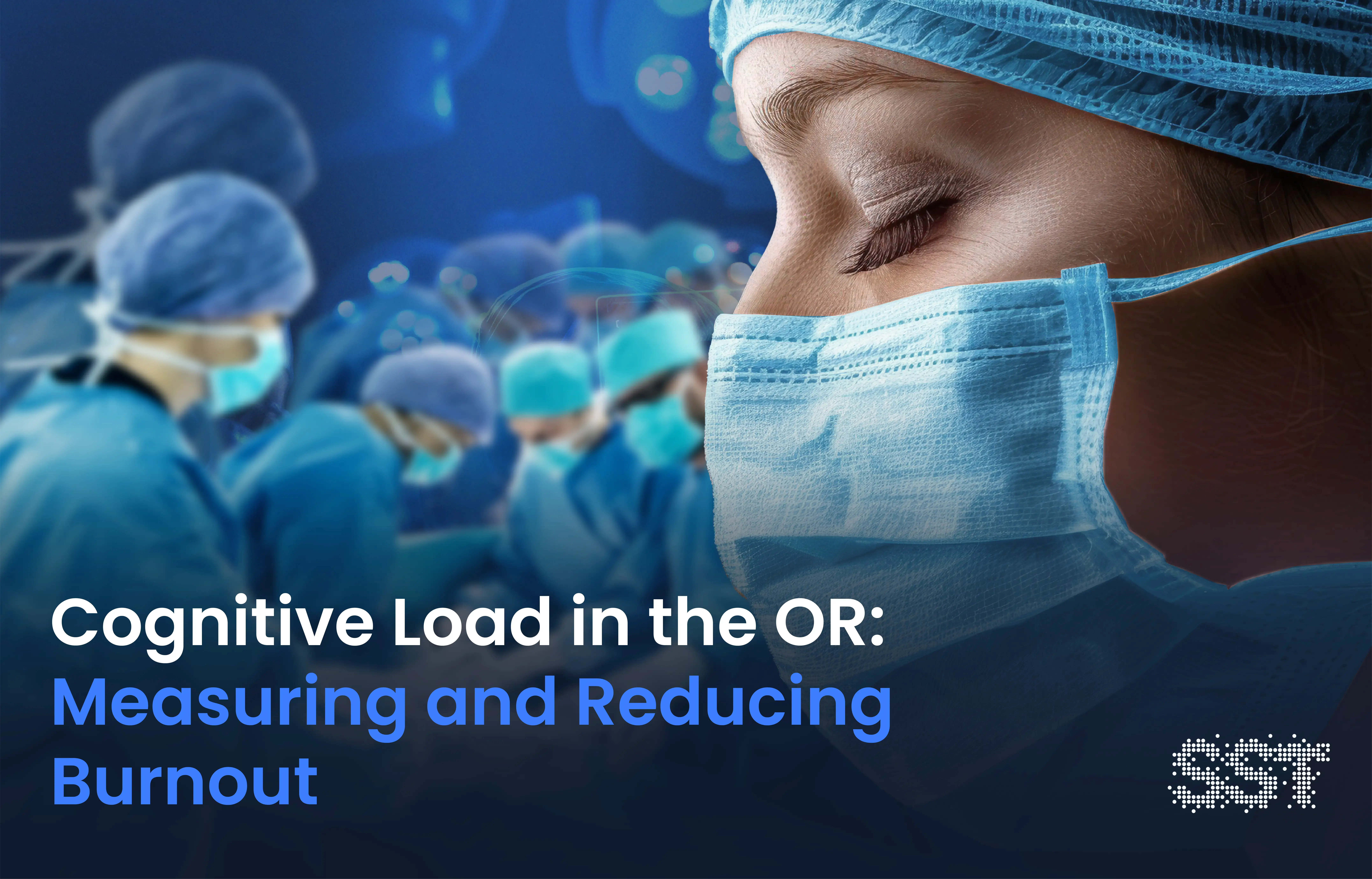CLINICIAN WELL-BEING
Creating Psychological Safety in Healthcare to Drive Performance, Retention, and Resilience
Discover how creating psychological safety in healthcare boosts performance, retention, and patient outcomes.
Jul 30, 2025
Surgical Safety Technologies
Psychological safety has become a strategic priority in healthcare. It affects team performance, staff retention, and organizational resilience. When leaders create space for open communication, clinical teams perform at a higher level, outcomes improve, teams stay engaged, and patients receive safer care.
Silence carries risk. Communication breakdowns remain the top root cause of sentinel events in U.S. hospitals, according to The Joint Commission’s 2022¹ and 2023 Sentinel Event Data Reviews.² Clinicians fail to catch near misses that harm patient outcomes and damage staff morale when they lack psychological safety and hesitate to speak up during critical moments.
Creating psychological safety in healthcare³ does not require perfection, but rather demands trust, structure, and leadership. Clinicians need to know they can raise concerns, ask questions, or share observations without fear of punishment—a cultural shift that must begin at the top.
Improving Clinical Performance through Psychological Safety
Teams that feel safe perform significantly better than those operating in fear-based environments. In a recent study, researchers discovered psychological safety in healthcare teams⁴ was associated with more reported near misses⁵ because healthcare workers were more willing to point them out, demonstrating that these teams do not hide problems but instead learn from them.
In healthcare, this culture leads to stronger team dynamics and safer patient care. Teams that communicate openly complete checklists more consistently, coordinate better in high-stress situations, and adapt quickly during unexpected events. In the operating room specifically, psychological safety enables effective briefings and debriefings where surgeons, nurses, and anesthesiologists speak freely, improving decision-making and reducing the risk of complications.
Performance does not improve through pressure alone. It improves when teams feel supported, respected, and empowered to speak without fear of retribution.
Retention Begins with Feeling Heard
Healthcare continues to face a staffing crisis driven by high burnout rates, with many clinicians leaving their roles due to moral distress and lack of voice. Toxic silence contributes significantly to turnover because clinicians disengage when they feel ignored or punished for speaking up. Over time, this disengagement leads to their exit from the organization or worse, the profession.
Creating psychological safety in healthcare reduces this risk by increasing engagement, especially among early-career staff and diverse teams. Clinicians who feel safe stay longer, contribute more meaningfully, and help build stronger teams. Data from the Agency for Healthcare Research and Quality (AHRQ)⁶ demonstrates a clear link between psychological safety and workforce stability, with hospitals that invest in psychological safety reporting higher staff satisfaction and lower attrition rates.⁷
Retention requires more that additional incentives—it demands a cultural transformation where leaders who listen and encourage others to speak up create genuine loyalty among their teams.
Building Resilience through Learning and Reflection
Resilience requires system-level support that enables learning from failure and fosters a culture of reflection and continuous improvement. Organizations that prioritize reflection recover more quickly from stress while their teams adapt more effectively to change, as clinicians in these environments examine what went wrong, identify patterns, and make meaningful improvements.
AI-driven clinical intelligence technology—like the Black Box Platform™—helps support this process by capturing real-time data from operating rooms, trauma bays, and other high-acuity settings to provide non-punitive insights that support learning and systemic improvement. These technologies allow clinicians to review cases, uncover trends, and refine practices over time while creating space for truth without blame, enabling teams to learn from events rather than assign fault.
This approach strengthens a culture of transparency and shared accountability, demonstrating that psychological safety depends on communication within a system that promotes reflection, reduces fear, and drives meaningful progress.
Operationalizing Psychological Safety in Healthcare: A Leadership Role
Hospital leaders must spearhead this cultural shift, recognizing that psychological safety begins with their daily behavior, policies, and priorities. Practical actions include:
Embedding psychological safety in leadership training programs
Structuring team briefings and debriefings into routine workflows
Using tools that enable real-time feedback and system-level reflection
Measuring psychological safety using validated instruments like the AHRQ SOPS survey⁸
Sharing data openly and without punitive consequences
Leadership presence makes a profound difference in this transformation. When executives model vulnerability, teams naturally follow their example, and when leaders actively invite feedback, teams feel empowered to speak openly. Culture change must start at the top and flow throughout the organization.
Successfully operationalizing psychological safety requires both unwavering commitment and robust infrastructure, including technology platforms, structured communication protocols, and leadership modeling that reinforces these values at every level.
Creating Psychological Safety in Healthcare: A Strategic Imperative for Better Care
Psychological safety represents far more than a soft skill—it serves as a critical driver of performance, retention, and resilience that strengthens teams, protects patients, and supports long-term institutional health. Hospitals that invest strategically in psychological safety build stronger organizational cultures, retain valuable talent, and consistently deliver safer patient care.
The time for leadership action is now, as the benefits are undeniably clear and the risks of maintaining a culture of silence are simply too great to ignore.
To explore how your organization can foster psychological safety at scale, download our fact sheet: AI in Healthcare: Maintaining Psychological Safety.⁹
If you’re interested in learning how the Black Box Platform supports reflection and system-level learning, we invite you to book a demo.
Recommended Reading
Mathias, J. (2023, April 4). The Joint Commission releases sentinel event data for CY 2022 [blog post]. OR Manager. https://www.ormanager.com/briefs/the-joint-commission-releases-sentinel-event-data-for-cy-2022
Belli, B. (2023, October 3). The Joint Commission reveals sentinel events remain high in 2023 [blog post]. OR Manager. https://www.ormanager.com/briefs/the-joint-commission-reveals-sentinel-events-remain-high-in-2023
Surgical Safety Technologies. (2025, May 8). Psychological Safety in Healthcare Drives High-Performance Teams - and AI Should Support It [blog post]. https://www.surgicalsafety.com/blog/psychological-safety-in-healthcare-ai-should-support-it
Surgical Safety Technologies. (2025, September 25). Psychological Safety in Healthcare Teams: From the OR Front Lines to Executive Strategy [blog post]. https://www.surgicalsafety.com/blog/psychological-safety-in-healthcare-teams
McCartney, J. (2024, May 8). Psychological Safety in the OR Improves Outcomes and Performance [blog post]. American College of Surgeons. https://www.facs.org/for-medical-professionals/news-publications/news-and-articles/bulletin/2024/may-2024-volume-109-issue-5/psychological-safety-in-the-or-improves-outcomes-and-performance/
Murray, J., Sorra, J., Gale, B., & Mossburg, S. (2024, March 27). Ensuring Patient and Workforce Safety Culture in Healthcare [blog post]. PSNet. https://psnet.ahrq.gov/perspective/ensuring-patient-and-workforce-safety-culture-healthcare
Boston Consulting Group (2024, January 4). Leaders Who Prioritize Psychological Safety Can Reduce Attrition Risk to Less than 3% of Workers [press release]. https://www.bcg.com/press/4january2024-psychological-safety-reduce-attrition-risk
Agency for Healthcare Research and Quality (2025). Surveys on Patient Safety Culture Program. https://www.ahrq.gov/sops/about/index.html
Surgical Safety Technologies. (2025). AI in Healthcare: Maintaining Psychological Safety [fact sheet]. www.surgicalsafety.com/resources/ai-in-healthcare-maintaining-psychological-safety







